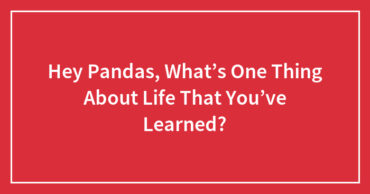Humans are wired to be social. Just think how good it feels to be with someone who understands you. Not only at a family reunion but also on a date, in a job interview—anywhere, really.
Yet we don’t click with everyone. And while it’s easy to blame the weather or the other person, sometimes we ourselves can be the problem.
To figure out how, Redditor Hnnnnnn asked platform users who consider themselves experts in people skills to share the most common errors they notice.
#1
Overestimating how much other people think about them. Unless you’re in someone “inner circle” they barely think of you at all.
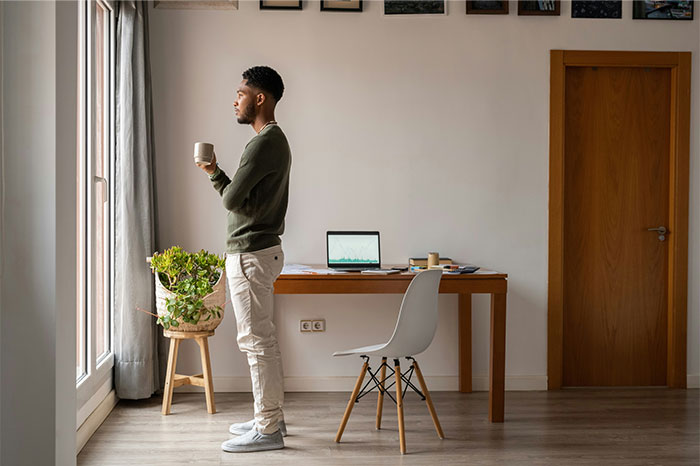
Image source: DeeJayDelicious, Milles Studio/unsplash (not the actual photo)
#2
A conversation is not a competition. Quizzing people, correcting people, trying to one-up people… don’t do that. I’m looking at you, Jake in IT. (A lot of IT people, actually.).

Image source: ArtSchnurple, Getty Images/unsplash (not the actual photo)
#3
Not understanding body language. Noticing if people want to be talked to, or want to be left alone. Noticing when groups are inviting, and when groups are not inviting. This can all be seen simply by looking at body language.

Image source: anon, A. C./unsplash (not the actual photo)
#4
This will get buried, but I’ll say it anyway in hopes that someone will find it useful:
Misunderstanding the purpose of “small talk.” I have friends with poor social skills who say they ‘hate’ small talk, and find it pointless. I suspect some even consider themselves superior to people who engage in ‘pointless chatter’.
They misunderstand the point of small talk is not explicitly in what is discussed, but in the subtext. The subtext of nearly all small talk between strangers is essentially: “hey person who is externally different than me: we are fundamentally the same! We are both people that experience life in the same ways. You’re one way, I’m a different way; but there’s many ways in which we experience life that are similar.”
*”Some weather we’re having.”*
*”Yeah, boy, it sure got cold quick.”*
This is not an exchange of information about the weather; it is two humans drawing closer by emphasizing that both of their lives are impacted simultaneously by forces outside their control, and secondarily that they live in the same geographical area.
*”Just got back from a few days in West Texas.”*
*”Oh, I drove through Lubbock a few years back. Real good brisket.”*
*”Yeah! It’s amazing, right?”*
Oh, you and I have different clothes, hair, and religious beliefs; but we’ve had a similar experience to which we reacted a similar way.
*”Did you catch the game this weekend?”*
*”Man, what a finish!”*
We’ve never met before, but we both invest in sports as a way to safely express emotion in a public space by using the triumphs and heartbreaks of athletic competition as a proxy for our experience; and we both experienced those same feelings together yesterday, even though we hadn’t even met.
Advanced examples:
*”Did you catch the game this weekend?”*
*”Oh, gotta tell you: I’m a Giants fan.”*
*”No! That’s criminal! How can you support those bastards!?”*
*”Well my grandpa was a fan, he passed it down to me”*
OR
*”well, growing up, I never followed sports. But one day I decided to follow baseball, and I fell in love with the game. Lived in San Fransisco at the time..”*
You and I like different teams, but we both like teams and so are the same.
*”Have you ever listened to the NPR show The Moth?”*
*”No, I never have. Should I check it out?”*
Person two is saying: even though we can’t bond over this shared experience, even though we’ve only just met, I trust you with my time and attention. I’m interested in things you find important and take you seriously.

Image source: Prince_Jellyfish, Getty Images/unsplash (not the actual photo)
#5
My mother always told me “People won’t remember what you said or what you did as much as they will remember how you made them feel.”.

Image source: skunkwrxs, Michael T/unsplash (not the actual photo)
#6
STOP MUMBLING I CANT HEAR YOU.

Image source: Matthewng525, pvproductions/freepik (not the actual photo)
#7
When people talk about their misfortune, hoping that you will pity them and be friends/date them. (Ex. I’m so fat. I’m so poor.) It makes an uncomfortable situation, and it makes me not want to be around you. I’ve had multiple guys try the pity card on me. If you’re trying to convince someone to be around you, why would you bring up your flaws?
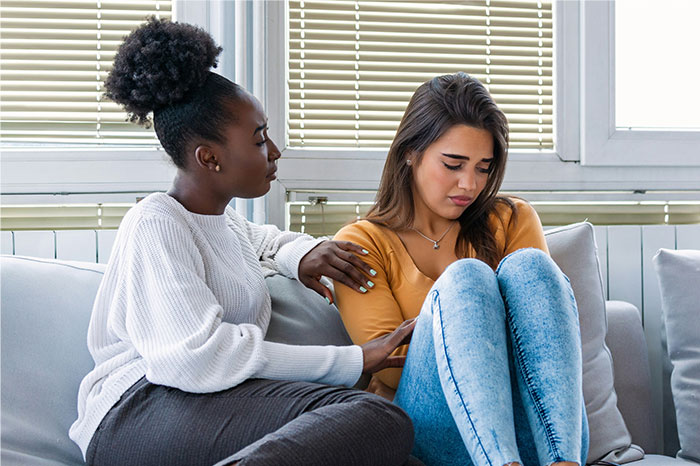
Image source: SpeedyEdie, Getty Images/unsplash (not the actual photo)
#8
Matching someone’s tone: if she seems distraught, respond with an equally concerned tone. If someone is excited, respond with similar enthusiasm.
Also always make an effort to listen to people’s stories, include everyone around you in a conversation by making eye contact.
Be humble and always refrain from bragging. A little bit of self-deprecation can actually go a long way in making people like you, just don’t overdo it.
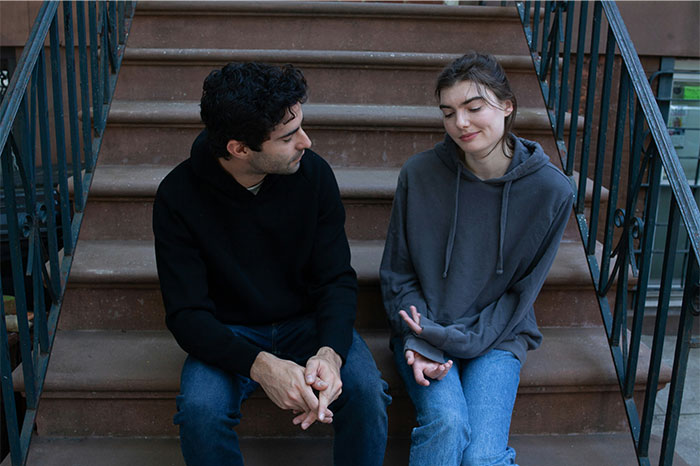
Image source: sallyhigginbottom, Gabriel Ponton/unsplash (not the actual photo)
#9
*Listen*. Don’t wait to talk.

Image source: Zer0_Karma, Kateryna Hliznitsova/unsplash (not the actual photo)
#10
Bringing your insecurities to a completely new situation where nothing has really happened to warrant them. This usually turns the other person off or at the very least treat you like an insecure person for no reason other than the fact you’re acting like one.
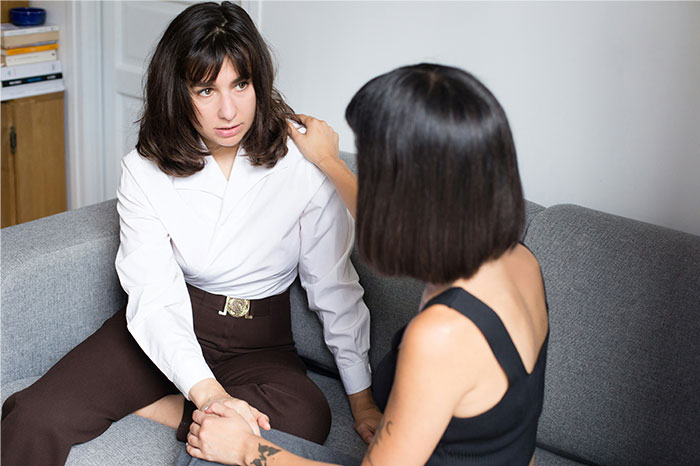
Image source: anon, Nini FromParis/unsplash (not the actual photo)
#11
Zero humor. Sure, some things are serious and humor would be in bad taste, but in normal conversation, if a laugh can be shared, it’s a positive experience.
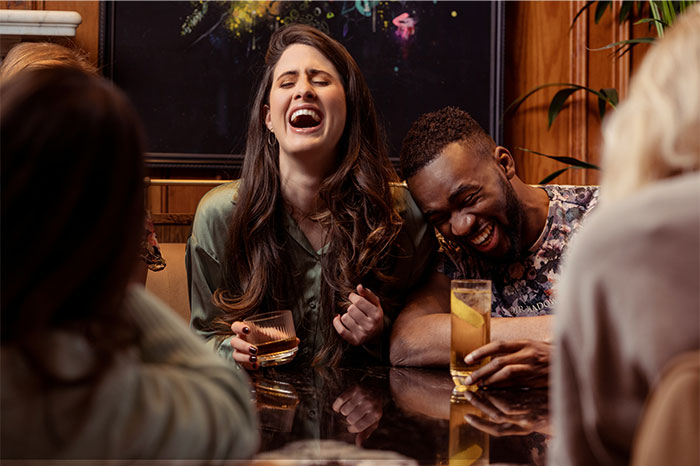
Image source: anon, OurWhisky Foundation/unsplash (not the actual photo)
#12
Not realizing when another person is uncomfortable.

Image source: anon, wavebreakmedia_micro/freepik (not the actual photo)
#13
Not everyone friendly towards you like likes you.

Image source: Montigue, Trung Thanh/unsplash (not the actual photo)
#14
**Empathy** – the most common mistake people make is that they do not consider the perspective of the other person. Many of the top-voted comments in this thread are symptoms of that — not noticing body language, overestimating the importance of small mistakes, bringing in insecurities, only talking about yourself, etc. All those can be solved by being more thoughtful about the interaction from the other person’s perspective (and less wrapped up in your own head about yours). How can you *make the other person ‘feel good’ by interacting with you*? Make that the goal and everything will make more sense.
**Guiding the conversation** – ever had a conversation with someone where everything seemed to flow, where you jumped from one good topic to the next, barely noticing the transitions as they happened? Now contrast that with a bad conversation, one where you tried to make it work but the other person gave you nothing. The difference is massive. Many people think conversation is a natural skill that can’t be learned — that’s wrong. It can be learned, practiced, honed. Empathy is key here; set the other person up to look good. How?
Think of conversations as a game, where Player A makes says one thing (e.g., “I’m going to NYC next weekend”) and Player B says the next thing. You’re Player B. You can respond in different ways — (1) ask why they’re going to NYC, (2) share a story about the last time you’ve been there, (3) change the topic. Now, if your goal is to set up Player A to feel good about the interaction, what is the best response of those three? The key here is to think one or two steps ahead each time (if I say X, where does that lead the conversation), always trying to set up the other person to have a good response and be able to continue the conversation — avoid paths that lead to dead ends!
**Finding their passion** – if you want to connect more deeply with someone, figure out what they’re passionate about and get them to open up about it. Most people have at least one topic that they can ‘geek out’ about. If you show a genuine interest in this and set them up to share their passion with you, you’d be surprised at how easy it is to make a meaningful connection with someone.

Image source: evanh, A. C./unsplash (not the actual photo)
#15
One thing I used to do a lot was I didn’t inhale before I started talking, so my voice was all high and fast and nervous-sounding. Breathing deeply and slowing down helped me sound calmer, and in turn I felt calmer.

Image source: rielephant, Getty Images/unsplash (not the actual photo)
#16
Playing up how you are so “awkward” and thinking other people will find it goofy or charming. There’s a reason why The Office was seen as cringe-comedy. If you’re aware you’re socially awkward but think people will laugh at your faux pas like bad personal hygiene, or unusual train of thought, you’ll just make people uncomfortable. I often interact with people who will put on a big show about how they’re so awkward/stupid and laugh about it, wear strange costumes or sloppy clothes to interviews, or not understand how to put themselves together as an adult and it makes things incredibly awkward. You’re not joining “the man” or being fake by presenting yourself as a functioning adult. I’m a mess with anxiety, I talk too much, and anyone who saw me at work would never guess how I dress on the weekends, but I’ve taught myself how to present myself professionally. (YouTube videos for hair/make-up, outlet shopping or eBay for Banana Republic or other nice clothes, and paying more attention to how others react to you and what you can do to improve)
TL;DR being awkward is not charming, it’s embarrassing for all of us. Get your life together.

Image source: sailorvaj, Christina @ wocintechchat.com/unsplash (not the actual photo)
#17
Forgetting that we are interacting with another human being, just like yourself, on the internet.
Which is why any large online community will often degrade to toxic environments without strict and unforgiving moderators.

Image source: LindenZin, Getty Images/unsplash (not the actual photo)
#18
Just being yourself. Confidence in the conversation, dont talk about stuff you dont know. Best part is to smile and make eye contact when talking.

Image source: addictivly-lurking, Fellipe Ditadi/unsplash (not the actual photo)
#19
This is typical in group situations.
Answering questions asked of others. By this I mean, people often ask questions of someone for reasons other than simply learning the answer. For example, one may ask a question to bring someone into the conversation, or to allow that person to speak from a position of knowledge and authority and thus create a basis for a positive relationship, etc…
People with poor social skills sometimes think that the purpose of all questions is to learn the answers to those questions, to exchange information. So, they may interject in order to provide the answer more quickly or (in their minds) more concisely or completely. If you do this, you come off looking like an jerk, not looking smart, as you may think.

Image source: realstoned, Getty Images/unsplash (not the actual photo)
#20
Be genuinely interested in the other persons conversation. Always offer your help, even when you’re not asked. Have the courage to engage, alot of people are also super shy and really appreciate it when you start the conversation.

Image source: anon, Getty Images/unsplash (not the actual photo)
#21
Not looking people in the eye. you dont have to hold it the whole time but if you dont master comfort with this you can’t move ahead.

Image source: tbleck, Getty Images/unsplash (not the actual photo)
#22
Not knowing when you are engaging in conversation with people who very obviously feel like they are being held hostage by your ramblings.
So often Ive seen people blathering on and on at parties/events/gatherings to people who are very blatantly trying to flee or are so obviously unengaged in the conversation. I dont understand how you can be so socially clueless to not know you are doing this.

Image source: mtthacke, drobotdean/freepik (not the actual photo)
#23
Staying stone-faced and not expressing any earnestness. One of the best and easiest ways to manage in conversation is to work smiling into your response pattern. The difference between “yeah…” with a neutral face and “yeah! :)” (for instance, when asking if you’d like to go to such-and-such) is immense. It puts people more at ease. If you give someone the choice between talking to the neutral face where you never know what they’re thinking, or someone who shows on their face, they’ll tend to prefer the latter.
If you’re shy and you don’t like to talk much, that’s okay– but make an effort to actively smile more (where appropriate) in conversation. It makes all the difference. You can practice it when you next go to the grocery store or Starbucks: before you order, greet the barista with a “hello!” and a sincere smile. You don’t have to share your life story, but just by visually expressing your enthusiasm you can make any situation easier to manage socially.
Interestingly this occurs in both men and women, and men and women hide their expressions for different reasons. Women tend to not want to appear “ugly” with a toothy smile or a hearty laugh– look at profile pictures to confirm, they’re almost always neutral expressions. Men tend not to want to look “weak” by being sincere. Both are unfounded fears. Smile! You’re alive! This also goes for unhappy expressions too. Show you’re confused or annoyed. Exaggerate a tiny bit starting out to get a feel for it– your face is your greatest social asset.
The other advantage of being a Big Face is that you’ll have an easier time with people who are from other cultures or don’t speak the language as well! It makes it easier for you socially and other people too.
Oh, one more thing– humour is always good but don’t go too dark too fast. I can’t count the number of times someone assumed that making a crude remark or a joke about violence would be okay… But it fell aggressively flat because they couldn’t understand social cues. You will frighten people.

Image source: anon, rawpixel.com/freepik (not the actual photo)
#24
Talking in a “victim mindset”(i.e. “I wasn’t able to do this, I wanted to do that, but because of the area I’m in”). I used to be bad about doing that until one day in the midst of discussion with a professor from Yale I was interrupted.
“Turkey, you seem like a nice guy, but you seriously need to stop. Not one person here cares about what you could’ve done or how you didn’t do something. Tell me about what you’re doing and what you plan on doing. Have a good one.”
And then he walked away. I felt really embarrassed at the time, but I’ve changed a lot because of that.
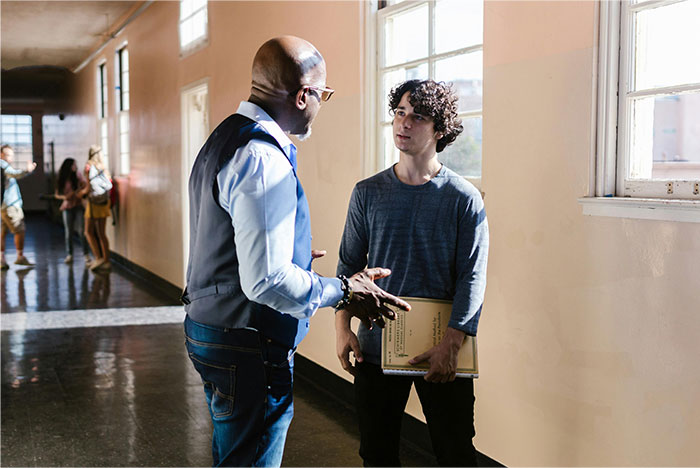
Image source: datwhiteturkey, RDNE Stock project/pexels (not the actual photo)
#25
The art of leaving a conversation before it gets awkward.
you see an old friend, you walk up…
“Oh hey! it’s been a while. What are you up to?”
*pleasant exchange*
KEY MOMENT – the second it looks like the small talk is over, the person that initiated the conversation *should* say…
“Well, i’ll let you get back to it. Drop me a line on FB/Whatever if you want to get together sometime!”
Everyone hates people who linger, and you come off as rude if you are the one who was approached who says the last line.

Image source: _Azweape_, The Yuri Arcurs Collection/freepik (not the actual photo)
#26
One quote to remember that will change the way you interact with others:
“We judge others by their actions, we judge ourselves by our intentions.”

Image source: krokusik, freepik/freepik (not the actual photo)
#27
I skimmed through the comments and didn’t see this spelled out. Ask questions. It’s so simple and people ignore it so much. Everyone likes to talk about themselves, so if you ask good questions you’re learning about the other person and they will walk away feeling like they’ve been heard. My background is in therapy and the best advice I was ever given as a therapist is to be dumb, caring, and kind with people. Dumb = asking questions, Caring = being genuinely interested and helpful, and Kind = being non-judgmental of what people tell you. In my graduate program we would alway make the joke that the best therapist is a totally DCK.

Image source: anon, Getty Images/unsplash (not the actual photo)
#28
The huge mistake I’ve made in my interactions with others for a long time was trying too hard to be liked by everyone. I would fairly easily make myself into who I thought people wanted me to be, and they seemed to like it, but in reality you’re being seen as an agreeable shell of a person, who no one will hate, but no one will really love either.

Image source: MisterJose, fabrikasimf/freepik (not the actual photo)
#29
Positive energy is key in all situations. I’ve learned this as a constant traveler who sees tons of different people, and I’ve had to deal with a lot of negative/exhausted people in a lot of random situations.
Positivity is like a get out of jail free card. If you’re dealing with someone sad/depressed/tired, you’re buffered against it, and have a chance of making their day better. If you’re dealing with someone really different from you, at least your good humor can power through the “?????” barrier. A smile is a smile in every society. Almost everyone appreciates talking to somebody who’s upbeat and smiling, as long as this is tempered by a bit of self-awareness. The “squeaky toy” fake positivity is the opposite of that – you see it a lot at yoga studios – but just genuinely being in a good place, and being inwardly determined to stay positive is the best way to enter any social interaction. And in general it’s a pretty fun way to go through life. Just having the DESIRE to stay positive is often enough to get you through most anything.

Image source: anon, Getty Images/unsplash (not the actual photo)
#30
One I haven’t seen yet:
Saying things that resonate with how they feel, rather than things that will resonate with the listener.
If you are angry, yelling feels right. It represents your emotional state accurately and evocatively.
But it’s also hostile, violent, and scary.
What it inspires in others is fear, defensiveness, derision, or righteous indignation.
It doesn’t help you get your point across.
If you are angry and you want _______. Say, “I am angry. I want _______.”
Seriously. This works.
Before doing or saying anything, ask yourself what your goal is. Then ask yourself if your actions will really get you closer to your goal or if they are merely cathartic.
This can turn all of your relationships around. Work, school, family, friends, romantic. All of them.
Want to make someone feel appreciated? Say “I’m glad you are part of my life.”
Someone hurt your feelings? “I’m sad/hurt/upset about that thing you did.”
Feeling confused or awkward? “Wow. I feel awkward/confused.”
Don’t feel like discussing it yet? “I really want to talk about things when I have had a chance to think them over for myself. I’m too upset right now to think straight and discussing it now would be ugly and unproductive. And that isn’t fair to either of us. How about we make a date for Thursday evening? We can talk it out like adults.”
This things they told you to do in kindergarten works. It’s so simple. People aren’t mind readers, even when you think it is obvious. We are all sort of wrapped up in our own experiences. Calming telling someone else what you are experiencing gives them the opportunity to invest in you. Being agitated makes it harder for people to connect with your experience.
Chill out. Take a deep breath. Pretend they are lines in a play. Invite people to the table. Lay your cards down face up.
Image source: Phantasmal
#31
One thing, confidence. I try to live by advice I got from an old coach in high-school, “confidence is the key to excellence.”
Once you have that, socializing comes kinda easy. And success with it follows
It’s very easy to notice the absence of it, and can make you unappealing.
But to get it, you have to experience some measure of success…
Kind of a catch 22.
Image source: math_is_my_religion
#32
Don’t try to impress anyone. Be genuine Listen to what they have to say, and stay relevant. some people you’ll connect with, some people you won’t.
Highly social people realize that AT LEAST 60% of socially connecting with someone is luck.
Nobody gets along with everyone. No funny guy can make everyone laugh. Once you realize that, you’ll have a lot less pressure once yourself, and socializing will be 100x easier.
Image source: neeltennis93
#33
It’s more what you don’t do than what you do. You have to talk to people as if you were in love with them. They have your complete attention, you give them space but you show *genuine* interest and you remember their name. Make your conversation close and genuine.
Image source: MinnieMouse2292
#34
The advice on this thread is mostly about how to not be a jerk. Most redditors have problems on the other end of the spectrum. They’re over-polite and it comes off as insincere and patronizing. If you come off as insincerely polite you are both boring and untrustworthy. How to not be over-polite:
* Don’t laugh at every single thing another person says. It’s a habit that makes you either seem nervous or seem like a try-hard. Laugh at *some* things when you find them funny, because it says, “Hey, we share the same perspective on things!” without smothering the other person and making you look desperate for a connection.
* Don’t agree with every single thing another person says (unless you legitimately do). Harmless disagreement (as in saying, “Nah, I disagree. I see it *this* way. What do you think?”) shows that you are sure of yourself and that you also aren’t scrounging for scraps in terms of friendships. It’s suspicious when another person unwaveringly agrees with everything I say. Do they have trouble making other friends? What do they want from me? Are they naive and fragile? Are they going to be an emotional leech that I know have to walk around eggshells around lest their innocent soul misinterpret something that I say? Also it’s BORING.
* If someone doesn’t want to talk to you, DO NOT try to keep being their friend. Do you ever go to parties and meet people then after a few minutes they decide they’re not that interested in talking to you? Most polite-redditor-types here would keep trying to talk to that person about god knows what. “Wow, we almost have the *same birthday.*” “Oh my god, I *love* Star Wars too.” Now this conversation has a time and place *after* a person has decided they like you and are curious enough about your life to talk to you. If you throw this information at them when they’re not initially interested in your life, you become an annoyance. “Look at me, look at how similar we are!” You don’t look nice. You look like you’re trying to get something out of them (and worse with nothing to offer in return). Besides, if you truly are exactly like another person, you’re BORING again anyway. They already know all your business. They’re going to go discover things about someone else instead. ALSO, this follows the same principle as Groucho Marx’s quote “I don’t want to belong to any club that would accept me as a member.” People want to be friends with people that they perceive as better than them. How do you look better then? DON’T look for everybody’s approval!
* Don’t try to look too perfect. Perfect is boring.
* Have a firm handshake if you want respect.
* Look people in the eye if you want respect. But not for too long, or else you look like a psychopath and/or on edge (again, suspicious). In passing, look as long as you need to notice their eye color and you’re good (about two seconds). In a face-to-face conversation, look about 3-5 seconds or so then look around the room for 1-2 seconds.
* A person will infer your social status by whatever information you give them. If you act important, people will think you’re important and treat you accordingly. Use this information with caution.
* Body language is important. Stand up straight AND look relaxed. Don’t slouch but don’t walk like you have a stick in your behind.
* Take up space when you need it. Don’t apologize for existing.

Image source: leopard_shirt, ASDFpik/freepik (not the actual photo)
#35
Assuming people have similar opinions and interests. I’m a white guy who lives in the deep south and owns a small business riding round in vans doing man stuff.
Sadly I don’t identify as republican, I’m not really into football or golf. I also hate bud light.
Image source: Bensav
#36
Lots of socially awkward people don’t seem to understand the concept of talking about anything that doesn’t relate to themselves. They may not have any relevant input to a conversation about, say, Vincent Van Gogh, so they morph the conversation into something they did/saw/felt/etc (like the Dr Who episode about Van Gogh) because they have no ability to think outside of their experiential bubble.
Of course, there’s nothing wrong with saying “I don’t have much experience in that subject,” but the person is usually trying to impress everyone and doesn’t think about what they are spewing.
Image source: anon
 Follow Us
Follow Us

